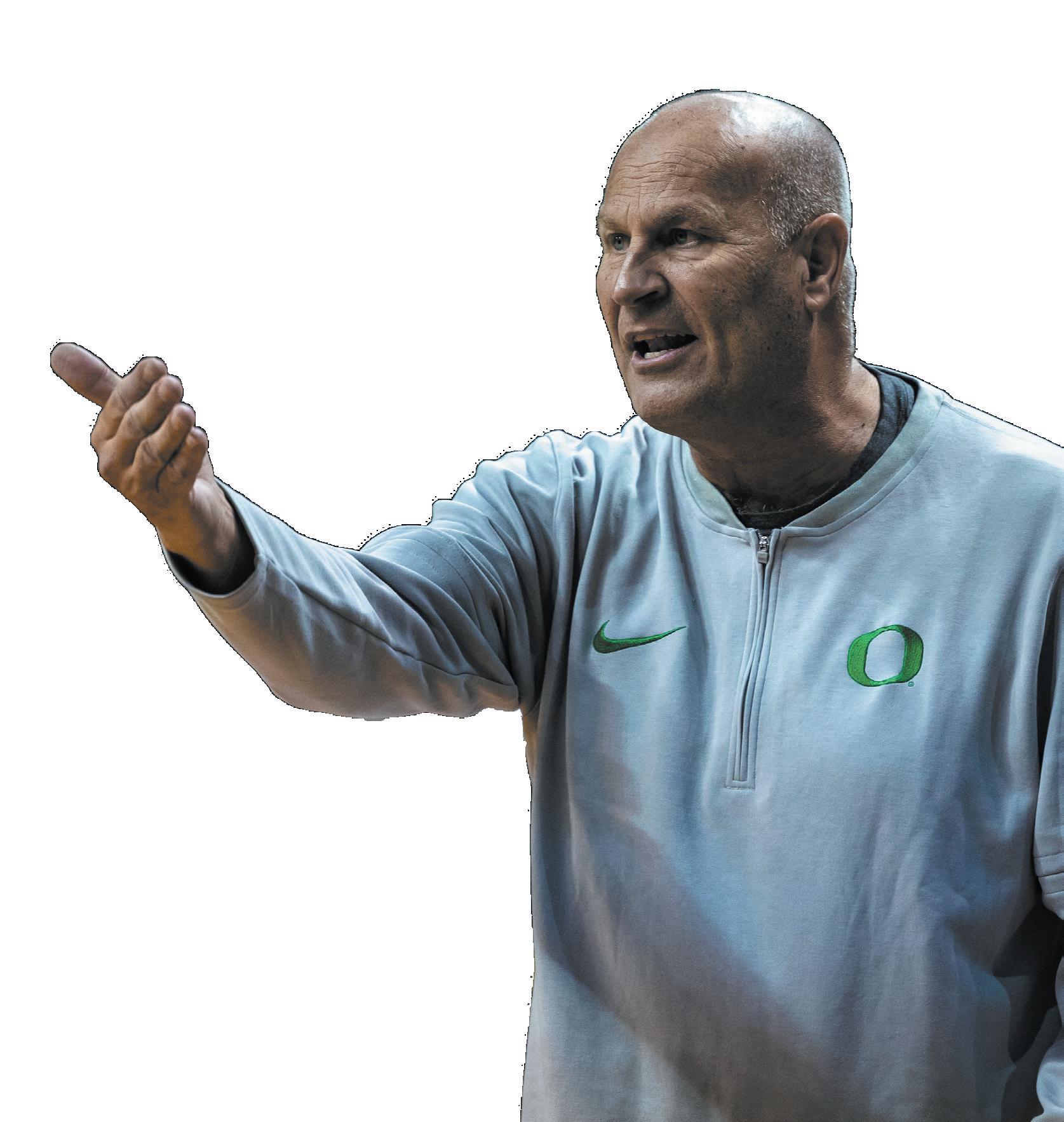

THE ELECTION WAS HEADED FOR A TENSE PRESIDENTIAL RUNOFF AFTER A SERIES OF GRIEVANCES FILED BETWEEN STUDENT SLATES. THEN A CANDIDATE DROPPED OUT.



THE ELECTION WAS HEADED FOR A TENSE PRESIDENTIAL RUNOFF AFTER A SERIES OF GRIEVANCES FILED BETWEEN STUDENT SLATES. THEN A CANDIDATE DROPPED OUT.


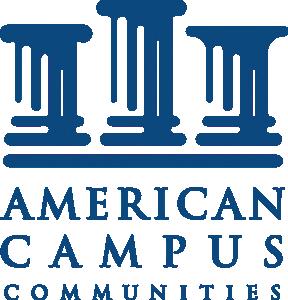






How can the University of Oregon increase sustainability?
BY GREY KAMASZ • DESIGNED BY EVA ANDREWSNEWSROOM
EDITOR IN CHIEF
Evan Reynolds
PRINT MANAGING EDITOR
Emma J Nelson
DIGITAL MANAGING EDITOR
Romie Avivi Stuhl
NEWS EDITOR
Tristin Hoffman
A&C EDITOR
Evan Huntington
SPORTS EDITORS
Nina-Grace Montes
Brady Ruth
OPINION EDITOR
Sophia Cossette
PHOTO EDITOR
Molly McPherson
DESIGN EDITORS
Liz Blodgett
Ryan Ehrhart
COPY CHIEF
Olivia Ellerbruch
SENIOR COPY EDITOR
Alex Woodward
VIDEO EDITOR
Anne Marie Armstrong
PODCAST EDITOR
Mirandah Davis-Powell
SOCIALS EDITOR
Alicia Santiago
VISUALS EDITOR
Stella Fetherston
BUSINESS
PUBLISHER & PRESIDENT
Eric Henry X317 ehenry@dailyemerald.com
VP OPERATIONS
Kathy Carbone X302 kcarbone@dailyemerald.com
DIRECTOR OF SALES & DIGITAL MARKETING
Shelly Rondestvedt X303 srondestvedt@dailyemerald.com
CREATIVE & TECHNICAL DIRECTOR
Anna Smith X327 creative@dailyemerald.com
ACCOUNT EXECUTIVES
Lola Tagwerker
Cori Caplinger
Cooper Gast
Taylor Baumgardner
ON THE COVER
Ian Finn, a UO graduate student and the campaign manager for UO Student Power, filed a majority of the grievances in the 2024 ASUO spring election. (Lulu Devoulin/Emerald)
THE DAILY EMERALD
The Daily Emerald is published by Emerald Media Group, Inc., the independent nonprofit media company at the University of Oregon. Formerly the Oregon Daily Emerald, the news organization was founded in 1900.

During Earth Week 2024, students shared their thoughts on what a sustainable university looks like.
Some students have similar ideas on the topic. UO junior and Indigenous, race and ethnic studies major Valentine Bentz said that, moving forward, the university should not be reliant on fossil fuels.
“A truly sustainable university would be one where it actually makes a commitment to its community and its students, that it’s not going to degrade the earth and the land that it’s offering,” Bentz said.
Ian Finn is a master’s student and member of UO Climate Justice League’s steering committee. Finn agrees with Bentz that it is important for the university to not rely on fossil fuels. They should instead prioritize more public transportation and green space instead of burning fossil fuels, he said.
The UO Office of Sustainability has taken some steps to create a more sustainable university. These steps include establishing an energy management program and reviewing and updating the Oregon Model for Sustainable Development.
However, some students feel that UO is reluctant to take climate action and that it takes large numbers of the student body to push for significant changes.
“Typically, it takes students organizing to push for the large changes, and again, I’m grateful for what this university has done,” Jack Dodson, campaign lead for Fossil-Free UO, said, “but it should be more willing to work with students and more willing to make improvements than it is now.”
The university has many environmental programs that aim to make the campus more sustainable, such as the Zero Waste Program and the Outdoor Program. Some students, such as Bentz, want the university to continue supporting these programs while expanding on them.
“There is some level of waste reduction that takes place in the dining halls with reusable dishes. I think that’s great [and] should be
Valentine Bentz spoke at a rally after the March 3, 2024, board of trustees meeting in Eugene, Ore. (Robert Scherle/Courtesy of Valentine Bentz)
expanded,” Bentz said. “Trash separation as far as recycling, that’s all very basic stuff they should be expected to be doing. There’s a lot of good stuff going on, but I think a lot of students want more.”
According to the Sierra Club, UO’s boiler system emits over 22,000 metric tons of carbon annually. This is something that many student activists vocally speak out against as they want the university to transition to cleaner energy sources.
“It’s really disheartening [to see] as a student at a university that strives for innovation … that they’re still pulling fossil fuels out of the earth,” Bentz said, “burning them to create harmful methane emissions and ending up as the second biggest emitter of fossil fuels in Eugene, so that needs to stop.”
Dodson said that he would like to see the university be more proactive with climate action, considering the urgent threat posed by climate change.
“The university has made improvements to make campus more sustainable, [but] it generally does this reluctantly,” Dodson said. “Typically, it takes students organizing to push for the large changes, and again, I’m grateful for what this university has done, but it should be more willing to work with students and more willing to make improvements than it is now.”
Beyond the pressing issues of carbon emissions and food waste, transportation remains top of mind for some students.
“I want to see a heavier investment by the university in programs like PeaceHealth bikes … and for us to move away from encouraging car use on campus,” Finn said. “Whether that’s shrinking the size of the parking lots or providing people with free access to bikes, it really comes down to making structural changes instead of just visual change.”
Students also want more information about university projects and affairs, like the thermal heating system transition. Some UO community members felt that they did not have all the information regarding potential new heating systems until the Board of Trustees meeting in March.
“We would like to see more public comment sections with up to date information and more communication environmental groups on campus and off campus in Eugene,” Dodson said. “This is a huge issue that affects a lot of people [and] it’d be great if these people had representation in the decision making.”

An April 18 speaking event with an Israeli Defense Forces soldier saw UOPD involvement and a countering protest by Students for Justice
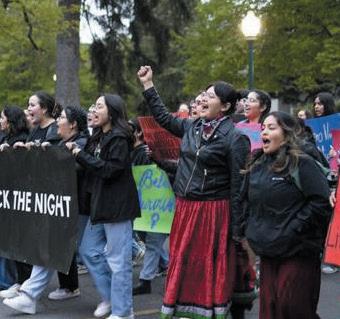
We want to hear from you:
Email editor@ dailyemerald.com to submit a tip or a letter to the editor. The ideal length for a letter is 200-500 words, but we publish letters of various lengths online.


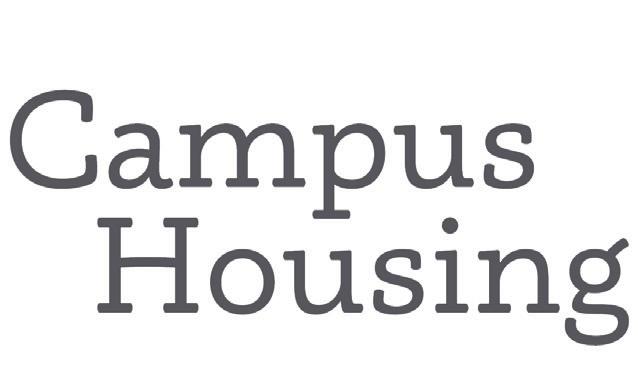




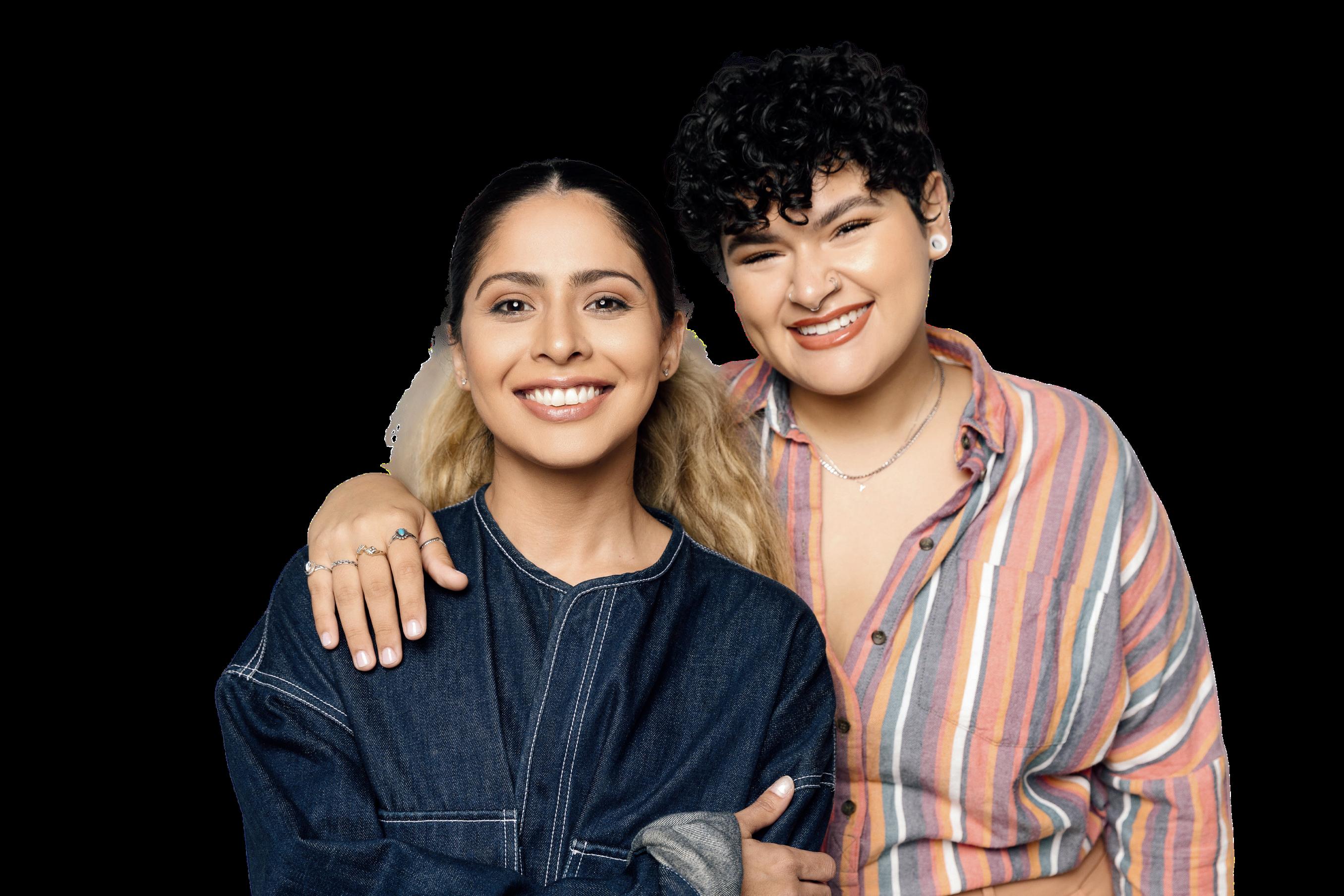


The first time I visited Eugene with college in mind, “disappointment” didn’t even begin to cover my impression. I walked through campus and the stretch of Franklin between Villard and Hilyard, and somehow concluded that was all there was to the town. Coming from Portland with exciting things to do on every corner, I was sure I would be bored out of my mind if I went to UO.
Further visits before the start of college dispelled this ridiculous notion. I saw a bit more of the city, but I was still sure I wouldn’t love living in Eugene long term. At that point, the only exciting and unique thing I had seen was the Saturday Market. I was impressed, but you can’t sustain your need for fun with only a seasonal, weekly market for four years.
Even during my freshman year, I didn’t do much exploring. After I moved into the dorms and realized this would actually be my home for the next four years, the city magically quadrupled in size in my mind. Even the campus was intimidatingly large as I tried to find my way around. I had friends from Portland who would complain that Eugene was tiny in comparison and had “nothing to do,” but I was too scared to even
BY SADIE TRESNIT • DESIGNED BY ADALEAH CARMANgive it a shot.
Espresso Roma on 13th Ave. was my first venture into the world off campus. Since then, it’s become a mainstay in my study sessions. As I got a bit more familiar with the campus, I became more “brave” with my adventuring. Suddenly, I was regularly walking down 13th to shop for records and see the sights.
Recently, my parents visited me for the weekend. They’ve lived in San Francisco, Chicago and Portland, so I naturally had to pull out all the stops and plan a fun-filled agenda for us. I admit I went a little crazy with it. By the time I was done, I had mapped out 25 local attractions for a 29-hour visit. It’s easy when you get started! We didn’t get to every single one, but we had a great time nonetheless.
As it turns out, there’s plenty to do in Eugene when you keep an eye out. Our local music scene
is pretty spectacular, all things considered. The first time I went to a house show with my friends, I felt like I had struck gold. Live music and a good view for under $10? They happen almost every weekend, especially now that the weather’s getting nicer, so ask your coolest friend to take you. If that’s not your thing, check out the amazing hikes nearby or treat yourself to a nice meal and a day of book shopping downtown.
As students, we have a fantastic bus system to get around town for free. Use it! I recommend making an afternoon out of record shopping at Moon Rock with lunch or an early dinner at Albee’s NY Gyros. But seriously, the city is your oyster. Stop complaining and explore! I promise you’ll find something kooky that the big cities don’t have.
The peak of Spencer Butte offers a great view of the UO campus. Eugene offers countless hiking spots that can be a fun way to get out and about in nature anytime of year. (Liam Sherry/Emerald)

DESIGNED BY EVA
ANDREWSOPINION: With STAR voting on the ballot in Eugene’s May elections, it’s crucial to highlight the system’s regressive tendencies toward representative democratic electorates
Growing political division and discontent within the two-party system has led to many states, counties and municipalities adopting voting strategies, like Ranked Choice Voting, to minimize the common phenomenon of “lost votes.” Oregon has already passed a legislative initiative to implement RCV into its elections, which will be on the ballot in November 2024 and await voter approval.
However, a new group is rising in the communities of Eugene and Springfield. They want to implement STAR voting, a voting mechanism that allows voters to assign numerical values to candidates and allows multiple candidates to score the same value.
Unlike RCV systems, which give one candidate preference over another, a STAR voting system would allow voters to rank all candidates on a scale of one to five. This proposed system would be a regressive measure to an already dissatisfactory voting system.
Implementing a voting system that allows voters to score candidates the same ranking essentially creates a complicated and redundant system that can cancel out votes. And, it doesn’t accurately represent voting demographics through voting behavior. For example, if a voter rates two candidates the same number, there is no ranked preference, which would cancel out both votes in a collective voting pool.
The subjectivity of ranking candidates is also widely problematic. A study conducted by the Pew Research Center showed that voters who lean Democratic are more likely to hold a critical view of their party’s governing structure or chosen candidate, which would lead to lower numerical scoring overall. The voting pool is misrepresented by ignoring partisan voting behavior or failing to include structural barriers to prevent “strategic voting.”
The most glaring problem is that this system has never been tested before in a public election.
Although STAR voting has been run through mathematical models and has been run through political simulations, this is not data but rather empirical evidence based on theoretical constructions of community behavior. In the two instances in which STAR voting was tested with primary delegation nominees, the voting preferences of the voters didn’t reflect the outcomes, and the overall voting preference did not show.
The Independent Party of Oregon used STAR voting in the 2020 election to decide the preference for Secretary of State, with the two candidates who earned the most votes entering a runoff election. Republican Kim Thatcher and Independent Ken Smith earned the most points to proceed to the runoff, while three other Democratic candidates split the votes and were not able to qualify for the runoffs. The second runoff showed that Thatcher had won by 36% of the votes, with nearly 30% of delegates voting that they didn’t have a preference for a particular candidate.
This, however, did not accurately represent the relative pool of voters; only 1,478 delegates voted for a Republican candidate, 1,240 voted Independent and the majority, 2,931 votes, were for Democratic candidates. This particular case study is a perfect example of the misrepresentation and structural flaws within STAR voting.
In an interview with Brian Smith, the co-founder of Tribal Democracy Project, he mentioned some of the leading causes of how STAR voting would be a detriment to the Eugene-Springfield area. One of the main issues that Smith calls to attention is the disenfranchisement of communities of color due to the robust opportunities to vote strategically, compared to other systems such as ranked-choice voting, which would allow voters to “vote their values.”
“Our focus becomes how this voting system works in theory and in practice,” Smith said. “STAR voting, in particular, doesn’t satisfy a number of criteria, with the main one being, does it work to enfranchise voters? It doesn’t. Does it reflect voters’ preferences? It does not. Our communities aren’t petri dishes to be used for experimentation.”
Next Up Action Fund, Building Power for Communities of Color, APANO Action Fund and Tribal Democracy Project are some of the many organizations and 501(c)4’s mobilized against STAR voting. In a press release, Elona Wilson, the executive director of Next Up Action Fund, said, “People deserve better than
a wild card system of voting, and that’s what STAR is — an untested system that makes it harder for people’s ballots to count on Election Day.”
The press release also elaborated on the financial implications of implementing STAR voting, stating that it would be a “costly change” that requires local elections officials to implement a new system, design, print and count ballots, which would be a “significant cost” to implement, especially considering the completely untested system.
Calling for electoral reform is necessary, considering the high dissatisfaction rate within electoral politics; however, Eugene-Springfield voters deserve an electoral system that accurately reflects and represents their voices. STAR voting doesn’t have the data to support this, and voters need a progressive system of reform, not regressive systems that worsen representative democracy.
(Stella Fetherston/Emerald)






MAX JENSEN “YELLED” AND “SCREAMED” AT STUDENTS FOR JUSTICE IN PALESTINE LEADER SALEM KHOURY MOMENTS AFTER HE WAS HEADED TO THE ASUO PRESIDENTIAL ELECTION RUNOFF
BY YSABELLA SOSA DESIGNED BY ADALEAH CARMANHours after the Associated Students of the University of Oregon presidential runoff election was announced April 8, UO Student Power presidential candidate Max Jensen abruptly dropped out and ceded the race to the OurUO presidential candidate Mariam Hassan.
At the time, “personal reasons” were cited as to why Jensen dropped out of the race.
However, Jensen had a verbal altercation with UO Students for Justice in Palestine co-leader Salem Khoury that same day regarding an April 5 grievance filed by Hassan and her running mate, Kikachi Akpakwu.
In a conversation with the Daily Emerald, Jensen admitted to having a verbal altercation with Khoury as a result of the grievance.
The grievance alleged that the UOSP campaign had been harassing both Khoury and another leader for SJP’s endorsement, though Jensen disagreed with the claims.
It was this reaction toward the grievances and verbal altercation which led to Jensen’s withdrawal from the runoff ballot between him and Hassan, according to an email ASUO Elections Board Chair Grigorii Malakhov received from Jensen. Hassan and Akpakwu won by default.
“I DON’T WANT A PRESIDENT WHO IS GOING TO TALK LIKE THAT TO PEOPLE”
At around 3 p.m. on April 8, Khoury walked into the Radical Organizing & Activism Resource Center, where Jensen is a co-director. Khoury was allegedly met with a temper from Jensen and accusations that Khoury was falsifying claims in the grievance.
“[Jensen] kept shaking his head at me and yelling and yelling and yelling, and saying really horrible stuff like ‘Get out of here.’ ‘You’re no longer welcome here.’’Get the f—k out,” Khoury
said.
According to Khoury, they attempted to have a conversation with Jensen to deescalate the situation, but Jensen continued, allegedly telling Khoury to “shut the f—k up” and that they “don’t get to talk.”
The altercation allegedly escalated to the point where two student leaders attempted to intervene and physically block Jensen from Khoury. Jensen allegedly continued to use verbal aggression.
While he technically still remains a co-director, Jensen confirmed he is “taking a step back” from the ROAR Center.
The ROAR Center declined to comment about the situation.
UOSP campaign manager Ian Finn, who heard about the altercation through phone calls with Jensen, described the situation between Khoury and Jensen as “unfortunate” and said he wished it did not occur.
“That is not the Max Jensen I’ve ever known. It’s not the Max Jensen anyone has ever known. He’s always just been a quiet, sweet guy,” Finn said. “ I would have loved to have him as ASUO president, but I don’t want a president who is going to talk like that to people or treat people like that.”
According to Finn, Jensen took the grievances of UOSP’s harassment “personally” as Jensen was under the “interpretation that the allegations were directed to him.”
A total of 9 grievances were filed, with at least one filed by each running slate —, UOSP, OurUO and Flock Forward. The majority were filed by Finn.
One grievance, filed on April 2, alleged animal cruelty against a candidate of the Flock Forward slate who brought a rabbit to campus during
campaigning. The grievance was dismissed on April 4. Two other grievances claimed that members of the OurUO slate failed to follow rules on prepackaged foods and campaign finance disclosures.
After speculations on OurUO’s source of funding, one grievance, filed by a member of the Flock Forward slate on April 4, alleged that OurUO was receiving funding from Campus Victory Project, an affiliation with Turning Point USA, an alt-right organization. The claims were dismissed by the Elections Board.
An April 4 grievance filed by OurUO campaign manager Sophia Olivares that UOSP violated the rules of posting flyers posters in unauthorized areas on campus, after concerns were raised by other slate members. From April 5 to April 6, UOSP was temporarily suspended from campaigning.
Despite the amount of grievances filed against UOSP, UOSP candidates won the majority of seats on the ASUO Senate, with 13 of the 26 races won.
The grievance filed by OurUO on April 5 alleging harassment was due to Khoury relaying their sentiment to Hassan and Akpakwu about receiving “passive-aggressive” messages, “baseless” in-person conversations and feeling treated like a“commodity” by the campaign.
According to Khoury, Jensen would actively mention his campaign with conversations alluding to an endorsement, but failed in trying to build a partnership with SJP.
“It was in my belief that not only did they want the logo, the name, the relevance, but also just to get our endorsement at a base level,” they said.
Khoury said that they would constantly receive messages and meeting requests from UOSP
slate members with the intention to get them to endorse UOSP, which Khoury cited as to why they felt “coerced.”
“Although I appreciate the intent to meet, I knew that it was going to be persuasion and it was going to be something upon the grounds of trying to get something from me instead of offering something for me, and that hurt,” they said.
Khoury did accept UOSP’s request for an endorsement on April 2, but Khoury cites these exceptions as “stressed out texts” as “coercion.”
An April 4 crosspost between SJP and UOSP, which has since been taken down, claimed that UOSP had received SJP’s endorsement. But behind the scenes, there was miscommunication.
Earlier that day, SJP co-director Salem Younes had sent UOSP a “neutrality” message in an attempt for the post to not be published, while Khoury had allegedly sent an approval message to UOSP for the post, according to Finn.
The Elections Board was then approached with screenshots of the messages, which was used as evidence to the claim that SJP did not enforce UOSP. This led the Elections Board to temporarily suspend UOSP from campaigning.
UOSP’s suspension was partially lifted after Finn provided the Board with information indicating the messages had been edited. Finn then filed a separate grievance against Hassan and Akpakwu.
this constant discussion around [UOSP]’s relationship with SJP, it was for lack of a more descriptive word ‘concerning,’ and made some uncomfortability at some points,” Garrety said. “There was a point in time where [Peters] and I seriously considered disaffiliat[ing] from [UO] Student Power more towards the end of the campaign.”
Both Garrety and Mohr agreed that the multiple grievances against UOSP affected the turnout of the elections.
According to Malakhov, Hassan and Akpakwu’s grievance is still awaiting a ruling by the ASUO Elections Board; however, since Hassan and Akpakwu declared a violation of the Student Conduct Code against Finn, any ruling the Board makes would not be effective.
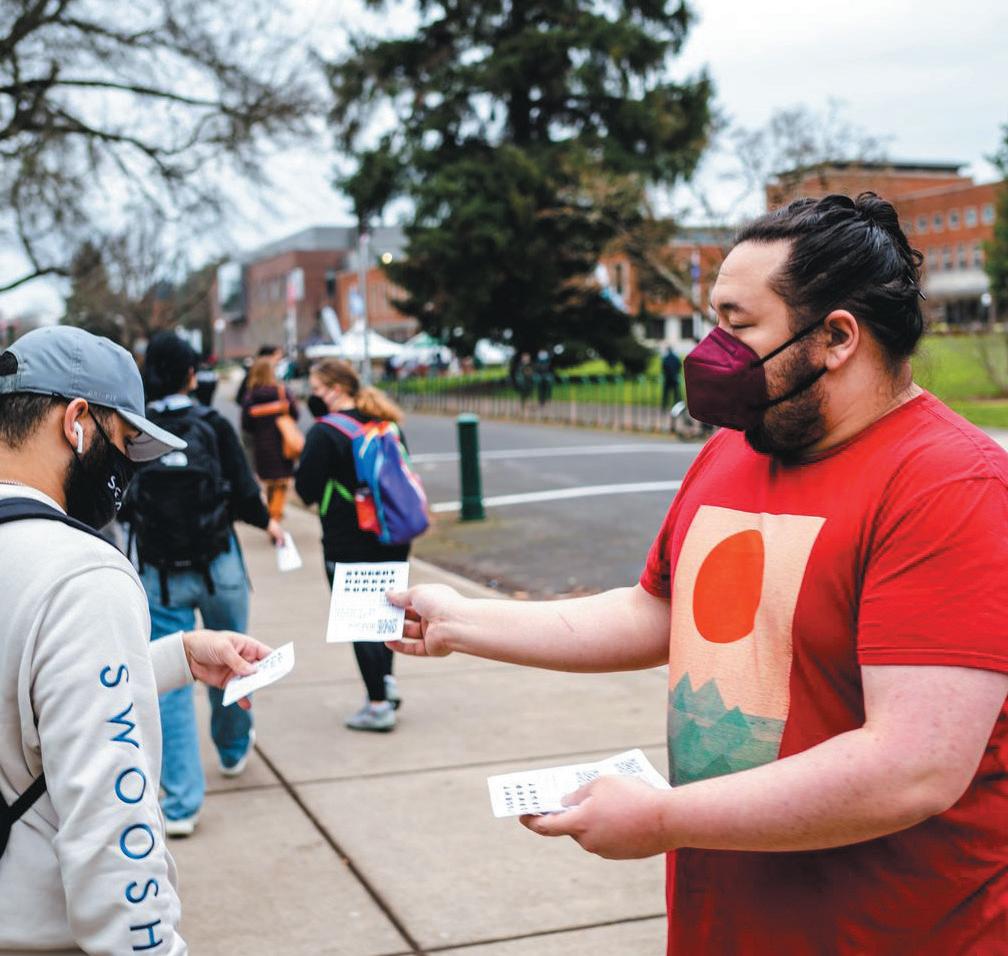
“The core of the grievance was again, altered texts. And again, they [text messages] were altered six minutes before the grievance was decided upon,” Jensen said. “So there’s really no other way to interpret that… in ways than someone lying about things that happen.”
Finn said he felt that Khoury’s actions had no malicious intent.
For UOSP slate member Tiera Garrety, the conversations involving UOSP and SJP made her and UOSP slate member Marisol Peters question their alignment with UOSP. Garrety and Peters are both co-directors of UO’s Native American Student Union, and won their runoff elections on April 11.
“As an indigenous person and having
Garrety’s experience with Jensen was described as “professional” and “pretty positive throughout the elections process.”
UOSP slate member Ian Mohr described their relationship with Jensen as “pretty nonchalant.”
“We will issue a decision, but I can tell you that there will be nothing that we can do because it’s not our call to make with the Student [Conduct] Code,” Malakhov said.
Finn’s counter grievance against Hassan and Akpakwu is still under consideration.
“I did not want anything to do with this and I did not want to endorse any campaign to begin with because it’s not our place because we are focused on liberating Palestine, not an undergraduate student body president election,” Khoury said.
Both Mariam Hassan and Kikachi Akpakwu declined to comment for this article.



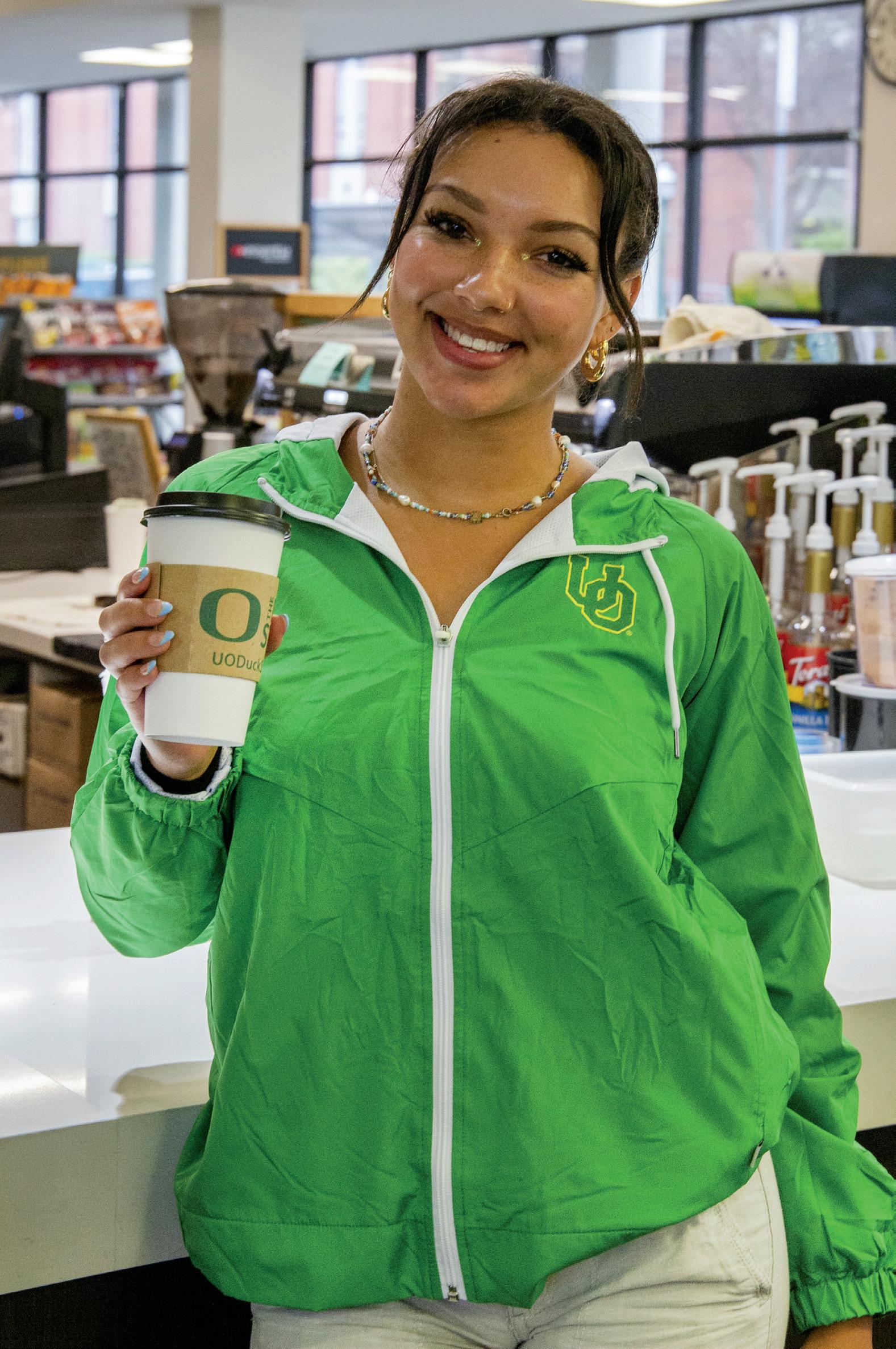


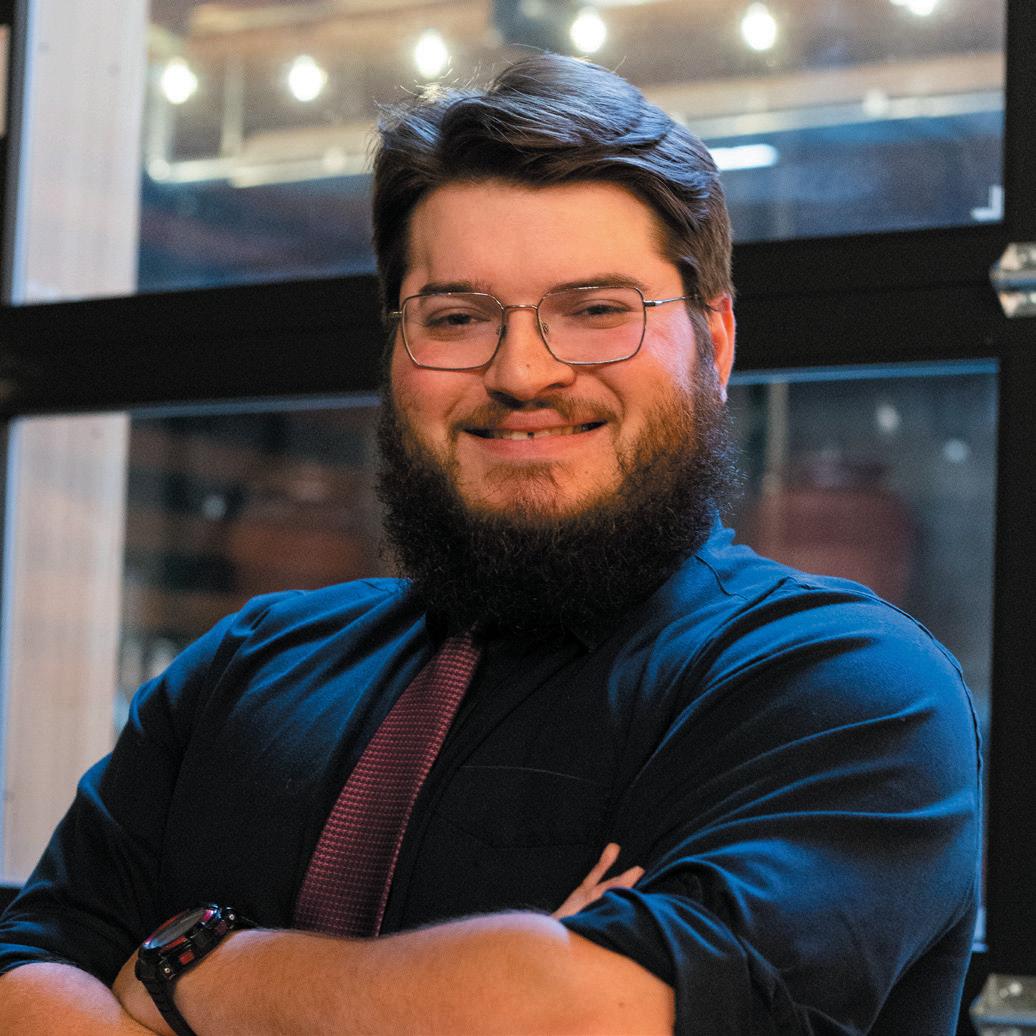

The Duck Store is more than just a place to buy your textbooks. It is a place where students can grab a quick bite to eat, fan gear, and art supplies. This is no coincidence. Since the 1970s The Duck Store has been a 501(c)(3) non profit organization, and before that operated as a student co-operative founded in 1920. It is run by a Board of Directors, representing students, faculty, and staff at the University of Oregon. Meet the Board President, Alex Rosen. He is a fourth year PhD candidate in the chemistry department, focusing on materials chemistry and sustainable alternatives to forever chemicals.
So my lab, the Darren Johnson lab, one of the previous members, Thaís de Faria, used to be on the board herself. When she graduated, she was leaving the graduate student position vacant. I am very industry aligned. I’m trying to start a business out of the research that I’m doing. Thaís came to me and was like, this is a great opportunity, the board’s really fun.
It’s been so informative. Because I’m trying to do small business formation and learn some of the entrepreneurship skills that I don’t have as a chemist, being able to see how a nonprofit runs. To see how business runs from the back end has been extraordinarily useful. It’s helped me to learn all the things that I don’t know in terms of finances, inventory, or HR management. It’s been great at connecting me with a lot of people. For instance, the CFO Andrew Moreland, has been really helpful by explaining some financial terms that I don’t understand. Anytime they [financial terms] come up in either The Duck Store meeting or in my own personal work.
The way I view The Duck Store is that it should be the best resource for students who need to buy pretty much anything. The Duck Store’s charter and mission: is to serve the campus, its students, faculty, staff, and the wider Eugene area to the best of its ability. And so I’m here knowing that it’s a nonprofit organization that is a student-led board compared to some of the other bookstores I’ve encountered at other universities. I think that it is doing a fantastic job of accomplishing its mission. And, you know, doing whatever it can to keep textbook prices as low as possible, to make it as simple as possible to get those books, any other supplies people need and then all of the details of serving the main campus and the Portland campus community. It’s a lot of plates to hold and spin at the same time, but it’s really inspiring to see how well the senior leadership team is doing at maintaining those many plates.
By far the biggest one is the Flock13 development that’s going up right next to the flagship store. While I was not instrumental in voting to approve that development to start, we are definitely able to see the culmination of that project. I think it is set to open its doors at the end of summer. A board five or six boards ago voted to start this development. Watching it grow and then now making sure that it’s on pace, going to visit or if there’s any other extra ways that we could leverage that as an opportunity to serve students. If The Duck Store needs to change its model of the flagship a little bit to be more of like a convenience store to serve the students that would live in that space. Those are some of the discussions we’ve had, and then on a little bit of a smaller scale. Recently, we’ve been working to make sure that the gift cards that the store provides every year to various student groups are getting distributed equally and make sure those are actually getting utilized by students.
Definitely run for a board position. There are a lot of open positions and there are open positions every year. So even if you aren’t able to run this year, but you think you might be interested in next year. Just run. The information always goes out in the newsletters. It usually gets posted to The Duck Store’s website. There’s various levels of involvement. So if all you have is one to two hours a month to go to a meeting, that’s all you need, really to be on the board. If you want to be more involved, you can, but that’s the bare minimum, which is usually pretty approachable.
I sat down with local rapper Andrew Kai to talk about his musical upbringing, his step-by-step beat-making process and more
Imagine a person who makes their presence felt as soon as they step into the room. Pair that with an instantly recognizable charisma and an unrelenting drive to be the best version of themself. All of these traits culminate together to make up Eugene-based rapper and superproducer Andrew Kai. I sat down with him to get a better understanding of who he is not only as a musician, but as a person.
Born in Oakland, Calif., but spending the majority of his adolescence in Bear Valley, Calif., Kai was able to spend lots of time honing his craft. He started making beats at 12, but his love for music didn’t start there. He started piano lessons at a young age, but he didn’t learn how to tickle the ivories in a way you’d expect.
Kai has Peters Anomaly, which “is a rare congenital disorder characterized by central corneal opacity with a relatively clear peripheral cornea.” Kai credits his “great ears” for his natural musical ability.
“I took piano lessons when I was 3 or 4,” Kai said. “I was just mimicking my piano teacher because I couldn’t read the sheet music.”
When Kai was 12, his dad gifted him a Numark turntable after downloading GarageBand onto his Mac.
“I remember that really sparked something for me,” Kai said. “I downloaded Serato and started mixing some stuff. It was cool because that led to me becoming my middle school and high school DJ … One time in particular I did a bass drop with the ‘Deez Nuts’ meme and all of the kids freaked out but the teachers hated me for it. That just spoke to my love for making music.”
Since Kai has been making beats for half of his life, he’s had a lot of time to grow as an artist. His latest album, “Everybody’s at the Party,” sees Kai operating in a concept album, with the first half written from his perspective and the second half as vignettes from the other party attendees. A personal highlight from the second half is “Tales,” where Kai showcases remarkably detailed and
BY CADEN TRAW DESIGNED BY GABRIELA MARTINEZpersonal storytelling backed by spacey production. “Confessionism” is another strong track, this time from the first half. Kai especially shines in the chorus, with layered vocals and soaring synth drones supporting the introspective lyrics, “Ego in control / Consume me whole / Pipe down pipe down / Check yourself.”
Later in this calendar year, Kai will release his third album of the decade, and he feels his growth has increased upon the release of each project.
“The difference between the last project and the next project is insane,” Kai said. “If I leveled up on the last project, then this time I leveled up twice. I had more to say on the melodies, I’ve caught pockets better and was able to find more interesting chords. But lyrically I’m more myself.”
Kai is an artist who has recently begun to see the value in collaboration as well. While he thinks he is at his best as a writer when he’s working by himself, he has also made some of his most meaningful songs with other artists.
“For my new song ‘Whatever,’ I remember after coming back from a trip saying ‘f*ck it, I’m back, let’s go,’” Kai said.
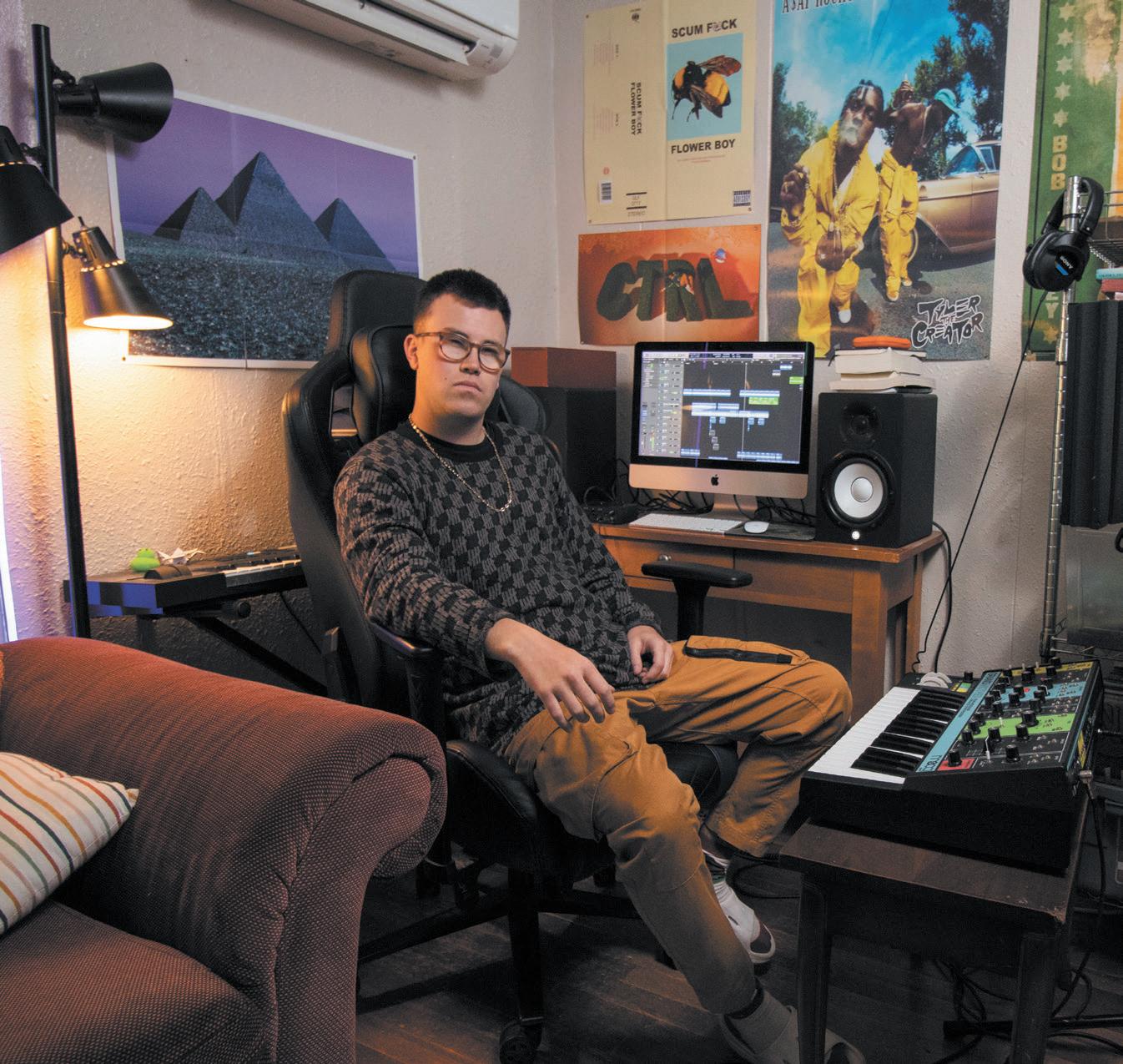
“Studio sessions, all day. I blew up like half of the Eugene scene. I had like 15-20 artists come through throughout the whole day. I went from noon-4 a.m.” You can tell while listening to the song how much of a communal effort it was. It features Asher Loewenstern on the synths, Amiia Nectar’s backup vocals, a trumpet intro and another verse from Chapstick. “It came together so organically. When I think back on it I just think ‘man, it was fun making this song.’ I value those things really highly.”
Andrew Kai is determined to make a name for himself as a rapper and as a producer. He can seamlessly transition between soulful, introspective ballads to energetic, speaker-blasting bangers with the best of them, and his two latest releases showcase that ability perfectly. Whether you check his music out online or in concert, Kai’s music will not fail to leave a mark.
This week’s picks...

Stop by the EMU green from 1 to 4 p.m. for the annual Spring Carnival! The Student Activities Board and Student Sustainability Center is providing sweet treats, food, games, prizes, inflatables and obstacles. Come check it out!
The UO Taiwanese Student Association is hosting its Plum Blossom Night Market at the Ford Alumni Center! Join them for a night filled with games, food, giveaways, a lion dance, a photo booth and special performances. Doors open at 5 p.m., food is served at 5:45 and performances start at 6:15. Come dressed in semi-formal attire or traditional cultural garments!
(Image: Kevin Wang/Emerald)
SUV alternative
Say “I do”
Tire speed stats
Speaker on a dais
Rd. crosser
“Pick me! Pick me!”
Closely held
Wide valley
Organ that produces insulin
Classic breath mint
Microwave
Ceramic cooker for a classic Boston dish
46 Blue toon in green overalls and a straw hat 50 Shiny and smooth 51 “__ you happy now?”
52 “Poor Things” Oscar winner Stone 56 “Please clap now!”
Formal sleeve style
Fail to include
Sweets
__ sauce: seafood condiment
Money dispensers
Noodle
Cries and cries
Genesis figure
Rock’s __
Site of many outdoor presidential press conferences
Bunny
e.g.
into
for one
Half-__: coffee blend
Standing tall
Camera lens setting, and a feature of both ends of 17-, 23-, 46-, and 57Across?
San Antonio field trip site
Irish novelist Binchy
hairstyle
of “Star Wars”
1 Furniture to crash on
2 Rapper Eazy-E’s given name
3 Truth alternative, in a party game








Do you know an exceptional student worthy of recognition and an award?
Help celebrate the twelfth annual 25 Ducks and nominate a deserving student. Taking nominations until April 30th.



Freshman commits Katie Fiso and Faith Ehis Etute are bringing a fresh attitude to Oregon women’s basketball
BY LILY CRANE• DESIGNED BY
LIZ BLODGETTMost of the practice squad had already cleared the Portland Trail Blazers practice facility on April 11, but one player stayed behind to put up a few extra shots. As Katie Fiso took off her practice jersey, she revealed a long-sleeved Oregon Ducks shirt.
This is the type of school pride that Oregon women’s basketball will add in the 2024-25 season. Incoming freshman guard Fiso played at the Northwest Shootout in Portland on April 14. Meanwhile, forward commit Faith Ehis Etute represented Team World at the Nike Hoop Summit in Portland the day prior.
Ducks’ fans have seen plenty of top recruits come into the program, show promise and then transfer. Fiso isn’t just a skilled No. 31 recruit; she’s a player who grew up a fan of Oregon women’s basketball.
“I loved Oregon ever since I was a kid. It’s been my dream school,” Fiso said. “Just to be able to have the opportunity to get the offer and be able to go there — it’s truly a blessing.”
She added that the “welcoming spirit” she received from the coaching staff sealed the deal. Etute was also swayed to join the Ducks because of the staff.
“I chose Oregon because of the coaches and teammates. I really liked them and I liked the place a lot,” Etute said. “I never played in green but I was really excited to try on the uniform. I really love ducks.”
Oregon is getting a vocal leader in Fiso. The reigning Washington Gatorade Player of the Year directed traffic on both ends of the floor on April 14. What may have seemed like a casual All-Star game to others was taken seriously by Fiso. She took on the title of floor general by putting up hand signals and shouting from the bench.
Fiso said that Ducks fans can expect “a burst of energy” from her next season. She never quit hustling in the Northwest Shootout on either side of the floor. Fiso exhibited her smooth jumper without forcing bad shots. The mental resolve to be a team-first player helped usher Garfield High School to three Washington state titles.
Her freshman counterpart Etute has a much quieter demeanor. The Luxembourg native did most of her talking on the court at the Nike Hoop Summit. Etute showcased her ability to seamlessly move past defenders to get a bucket despite being a smaller forward.
Etute previously impressed fans with her play at the 2023 U18 Women’s European Championship. In six games she averaged 31.5 points and 23.3 rebounds, including a 40-point, 33 rebounds and eight steals performance against Romania. Etute didn’t come close to those numbers on April 13, but she still scored 12 points and hauled in four rebounds in 13 minutes.
Fiso participated in scrimmages against Etute’s World team ahead of the Nike Hoop Summit as part of the Portland Lady Generals. The practice squad also included 2025 commit Sara Barhoum. The three were able to gain an early impression of what the future looks like.
“She’s a really great player,” Etute said when talking about what it was like to play against Fiso. “She really made it hard for us to win.”
The 2023-24 season was well below the usual standard of Ducks basketball. Oregon lost a program record of 14 games in a row to finish the season. To make matters worse, two of the Ducks’ top players, Grace VanSlooten and Chance Gray, transferred at the beginning of April.
Many fans and media members have questioned the leadership of head coach Kelly Graves and his staff. The freshmen duo, however, remains confident in the program’s direction.
“I trust the coaching staff. I trust their decisions and their playmaking — their high-level coaching with high intelligence,” Fiso said. “So just trusting their plan
